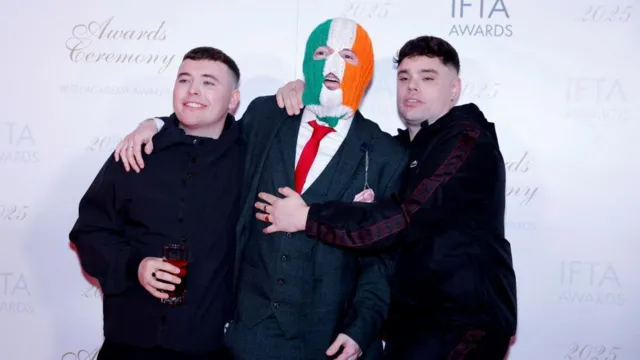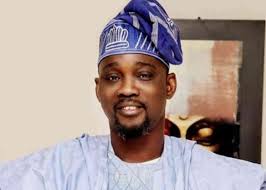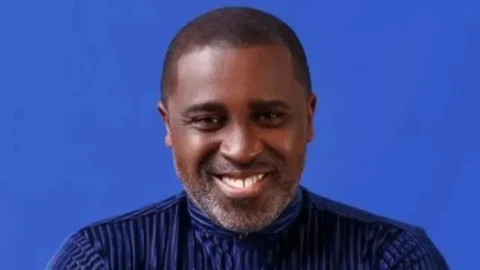Liam Óg Ó hAnnaidh, known by his stage name Mo Chara, and a member of the Irish-language hip-hop group Kneecap, has been charged with a terrorism-related offence in the UK after allegedly displaying a flag associated with Hezbollah during a performance in London.
The charge stems from an incident on 21 November 2024 at the O2 Forum in Kentish Town, where a video reportedly showed Ó hAnnaidh displaying the flag of the proscribed organisation.
Following an investigation by the Metropolitan Police’s Counter Terrorism Command, the Crown Prosecution Service authorised the charge.
Ó hAnnaidh, 27, is now set to appear at Westminster Magistrates’ Court on Wednesday, 18 June.
In an official statement posted to Kneecap’s social media platforms, the group strongly rejected the charge, calling it politically motivated and out of touch with more pressing global issues.
“We deny this ‘offence’ and will vehemently defend ourselves,” they wrote. Expanding on their stance, the group added: “This is political policing.
This is a carnival of distraction. 14,000 babies are about to die of starvation in Gaza, with food sent by the world sitting on the other side of a wall, and once again the British establishment is focused on us.”
The group’s response has drawn both support and criticism online, further intensifying public attention around the case.
The Metropolitan Police revealed that they were first alerted to the video on 22 April 2025. The footage, which had circulated widely online, prompted an official inquiry into whether Ó hAnnaidh had expressed support for Hezbollah—an act considered illegal under UK terrorism legislation.
A spokesperson for the Met confirmed that the investigation concluded with enough evidence to press charges, and Ó hAnnaidh was formally charged under his anglicised name, Liam O’Hanna.
According to authorities, the video is being treated seriously, as Hezbollah is recognised as a terrorist organisation in the UK, and expressing support for it is a criminal offence.
Further complicating the controversy, earlier this month, additional videos surfaced allegedly showing Kneecap members chanting slogans interpreted by some as incitements to violence.
These included shouts of “up Hamas, up Hezbollah” and references to violence against British Members of Parliament. Both Hamas and Hezbollah are banned entities in the UK, and such expressions are legally punishable.
The police have confirmed that these videos are under active review by counter-terrorism officers.
However, Kneecap has firmly stated that their remarks have been misconstrued or taken out of context, asserting they do not and never have supported violent extremism.
In their statement, Kneecap said: “We have never supported Hamas or Hezbollah, and we do not incite violence against anyone. The footage being used against us is being twisted for political reasons.”
They also noted that their sets often feature satire and political commentary, and that any provocative material must be understood within that artistic framework.
Despite their defense, the public fallout has been swift. Several of the group’s upcoming gigs have been cancelled, with promoters citing reputational risk and public safety concerns.
Kneecap’s situation has reignited broader debates about free speech, artistic expression, and political censorship in the UK.
The group, known for their Irish-language lyrics and unapologetically rebellious tone, has a history of ruffling feathers with their political messaging.
Formed in 2017 by friends Mo Chara, Móglaí Bap, and DJ Próvaí, Kneecap quickly rose to prominence in both the Irish and international underground music scenes.
Their fusion of political critique and traditional Irish culture earned them both acclaim and controversy.
Critics say their work frequently pushes the limits of acceptable discourse; fans argue it challenges oppressive systems and gives voice to the marginalized.
Their fame extended beyond music earlier this year when a semi-fictionalised film about the group, featuring Oscar-nominated actor Michael Fassbender, won a British Academy of Film and Television Arts (BAFTA) award in February 2025.
The film’s success further elevated their global profile, especially in progressive circles.
However, it also invited closer scrutiny from more conservative political figures and commentators who have repeatedly criticised Kneecap’s anti-establishment rhetoric.
Many of those critics have seized on the recent charges as proof of the group’s alleged alignment with radical ideologies.
In April, the group sparked controversy again during a performance at the Coachella music festival in the United States, where they displayed messages critical of Israel’s role in the war in Gaza.
This action led to a swift backlash. They were subsequently dropped by their U.S. visa sponsor and booking agency, Independent Artist Group (IAG).
British television personality Sharon Osbourne publicly demanded the revocation of Kneecap’s U.S. visas, arguing that their messaging crossed a line from political critique into dangerous territory.
The current legal case also has political reverberations in the UK. Footage from Kneecap’s past performances was circulated by Conservative Party leader Kemi Badenoch, who renewed her criticism of the Labour government.
Badenoch referenced a previous incident in which Kneecap won a legal case after she, while serving as a government minister, blocked an arts grant awarded to the group.
“This is what happens when Labour enables dangerous ideologues masquerading as artists,” she said, reigniting tensions between free expression and public funding.
Despite the mounting controversy, Kneecap is still scheduled to headline the Wide Awake festival in Brockwell Park, South London, on Friday.
Organisers of the festival have not commented on whether the group will still perform.
The case of Liam Óg Ó hAnnaidh continues to unfold, sparking nationwide conversations about the line between political dissent and extremism.
As the legal process begins, all eyes will be on Westminster Magistrates’ Court on 18 June, where the fate of one of Ireland’s most provocative musical voices may be decided.








